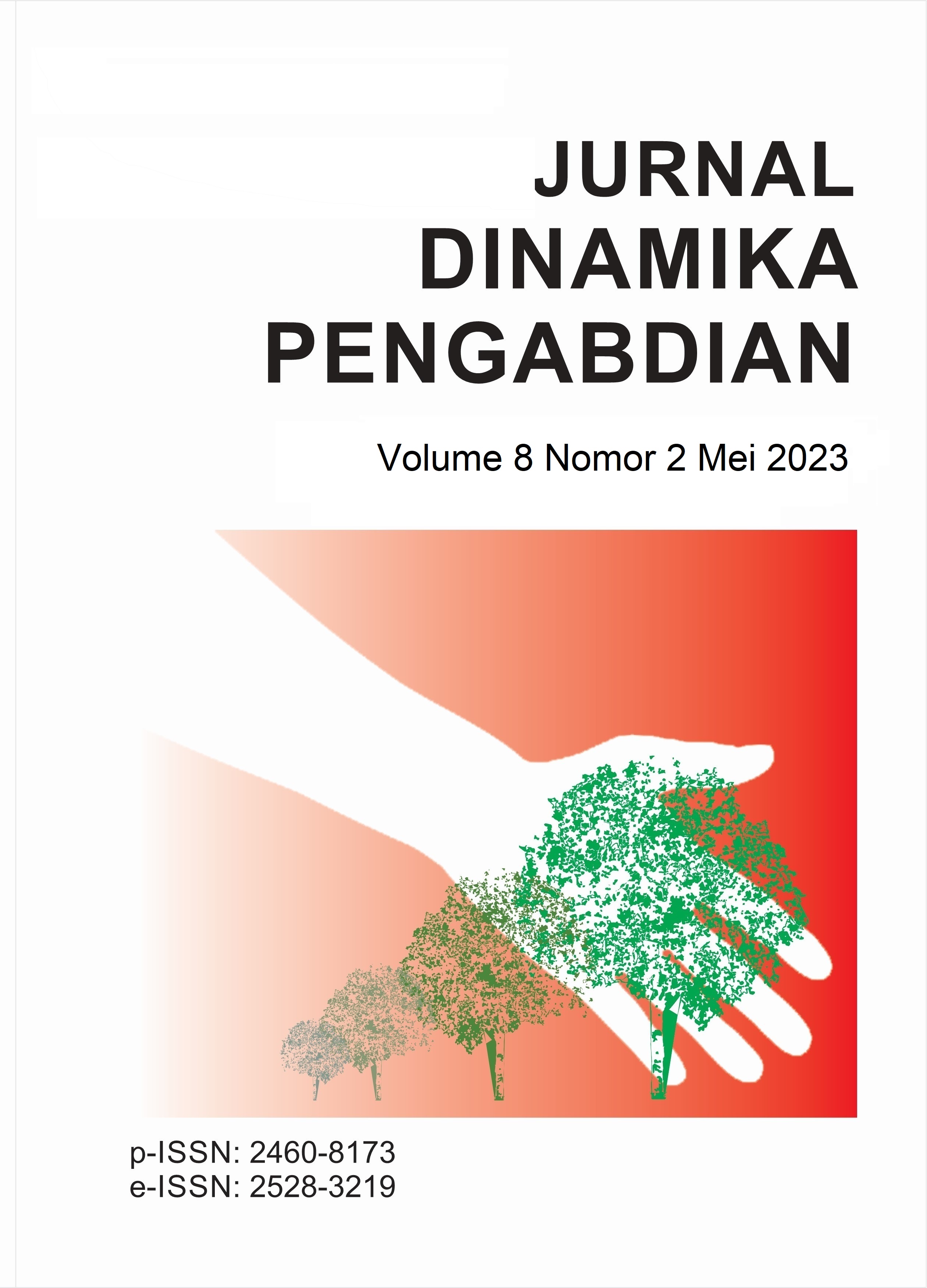SOSIALISASI SISTEM PRODUKSI KAKAO BERBASIS BIOCHAR UNTUK PENINGKATAN PRODUKTIVITAS LAHAN DAN PENDAPATAN KELOMPOK TANI MAMMINASA DECENG DI KABUPATEN SOPPENG
DOI:
https://doi.org/10.20956/jdp.v8i2.24207Keywords:
Biochar, Karbon Kredit, Lokakarya, Perkebunan, Kelompok taniAbstract
Faktor pembatas dari pengembangan kakao di Kabupaten Soppeng adalah serangan penyakit busuk buah, kekeringan pada saat penanaman bibit dan ketersediaan pupuk yang tidak memadai. Sistem produksi kakao berbasis biochar merupakan suatu teknologi budidaya kakao yang memanfaatkan limbah perkebunan kakao dan sekitarnya untuk diolah menjadi biochar yang akan digunakan sebagai sumber bahan organik tanah. Kegiatan ini bertujuan untuk meningkatkan wawasan dan pengetahuan petani terhadap teknologi sistem produksi kakao berbasis biochar ditinjau dari sudut pandang, pemerintah, peneliti lokal dan internasional serta praktisi. Luaran dari kegiatan ini adalah 6 orang dosen dari Universitas Muhammadiyah Parepare melakukan kegiatan di luar kampus dalam bentuk pengabdian kepada masyarakat. Kegiatan ini juga melibatkan 15 orang mahasiswa agroteknologi dan 5 mahasiwa ekonomi dan bisnis untuk berkegiatan diluar kampus yang dapat mengkonversi CPMK 3 matakuliah: 1)budidaya tanamana pangan dan perkebunan; 2) kesuburan tanah dan pemupukan; dan 3) penyuluhan. Selain itu penerima manfaat yang lebih utama adalah kelompok tani Mamminasa Deceng sebanyak 25 orang. Dalam kegiatan ini diperoleh komitmen dari 25 orang kelompok tani untuk melakukan pengolahan bahan organik melalui pembakaran tanpa asap.
Kata kunci: Biochar, karbon kredit, lokakarya, perkebunan, kelompok tani.
ABSTRACT
The limiting factors for cocoa development in Soppeng Regency are black pod disease, drought during seed planting and inadequate availability of fertilizers. The biochar-based cocoa production system is a cocoa cultivation technology that utilizes cocoa plantation waste and its surroundings to be processed into biochar which will be used as a source of soil organic matter. This activity aims to increase farmers' insight and knowledge of the technology of biochar-based cocoa production systems from the point of view of the government, local and international researchers and practitioners. The output of this activity was that 6 lecturers from Muhammadiyah Parepare University carried out activities outside the campus in the form of community service. This activity also involved 15 agrotechnology students and 5 economics and business students for activities outside the campus that could convert CPMK 3 courses: 1) food crop and plantation cultivation; 2) soil fertility and fertilization; and 3) counseling. In addition, the more important beneficiaries are the Mamminasa Deceng farmer group of 25 people. In this activity a commitment was obtained from 25 farmer groups to process organic matter through smokeless combustion.
Keywords: Biochar, carbon credit, workshops, plantations, farmer groups.
References
BPS. (2020). Statistik Kakao Indonesia. BPS -Statistik Indonesia.
BPS. (2021). Provinsi Sulawesi Selatan dalam Angka, 2020. http://www.ghbook.ir/index.php?name=
Enders, A., Hanley, K., Whitman, T., Joseph, S., & Lehmann, J. (2012). Characterization of biochars to evaluate recalcitrance and agronomic performance. Bioresource Technology, 114, 644–653. https://doi.org/10.1016/j.biortech.2012.03.022
FAO. (2015). Soils store and filter water. 14–17. http://www.fao.org/3/a-i4890e.pdf
Iswahyudi1, Syukri1, U. (2018). Pengaruh Pemberian Pupuk NPK dan Biochar terhadap Pertumbuhan dan Hasil Padi Sawah (Oryza sativa, L). 5(2), 1–14.
Rawat, J., Saxena, J., & Sanwal, P. (2019). Biochar : A Sustainable Approach for Improving Plant Growth and Soil Properties. https://doi.org/DOI: 10.5772/intechopen.82151
Srivastava, R. K., Shetti, N. P., Reddy, K. R., & Aminabhavi, T. M. (2020). Sustainable energy from waste organic matters via efficient microbial processes. Science of the Total Environment, 722, 137927. https://doi.org/10.1016/j.scitotenv.2020.137927
Sukmawati, Ala, A., Baharuddin, & Gusli, S. (2020). Biochar interventions enriched with alginate-producing bacteria support the growth of maize in degraded soils Biochar interventions enriched with alginate-producing bacteria support the growth of maize in degraded soils. 0–10. https://doi.org/10.1088/1755-1315/486/1/012133
Tripathi, M., Sahu, J. N., & Ganesan, P. (2016). Effect of process parameters on production of biochar from biomass waste through pyrolysis: A review. Renewable and Sustainable Energy Reviews, 55, 467–481. https://doi.org/10.1016/j.rser.2015.10.122
Xiang, Y., Deng, Q., Duan, H., & Guo, Y. (2016). Comparison between different D-Dimer cutoff values to assess theindividual risk of recurrent venous thromboembolism: Analysis of results obtained in the DULCIS study. International Journal of Laboratory Hematology, 38(1), 42–49. https://doi.org/10.1111/ijlh.12426.
Downloads
Published
How to Cite
Issue
Section
License
Copyright (c) 2023 Jurnal Dinamika Pengabdian (JDP)

This work is licensed under a Creative Commons Attribution 4.0 International License.
Penulis diwajibkan untuk menandatangani "Surat Perjanjian Hak Cipta" atau Copyright Agreement untuk penyerahan ijin kepada pihak jurnal untuk menerbitkan tulisannya.
Authors are required to sign a "Copyright Agreement" to submit permission to the journal to publish their writings.







